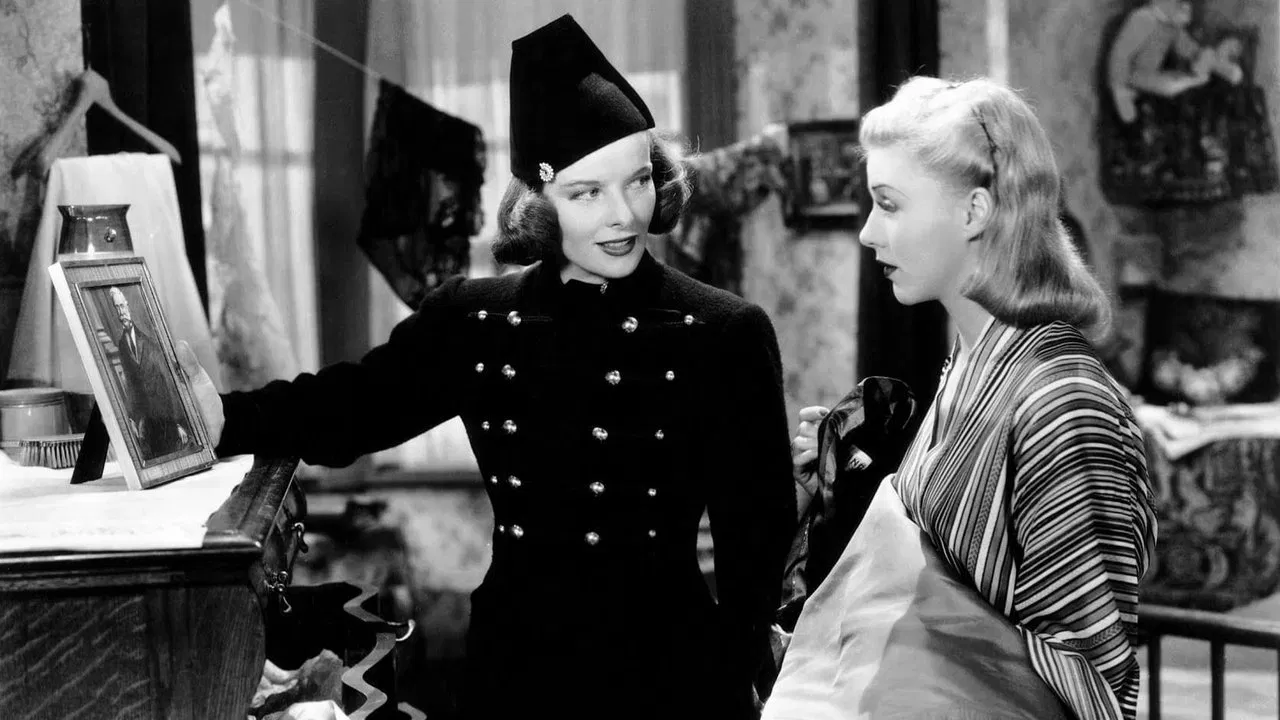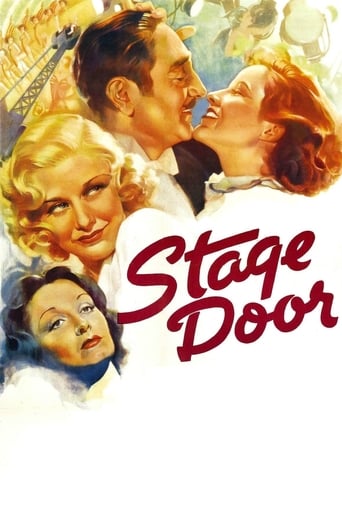

While watching this film I couldn't help but think about the possibility of having this remade in today's Hollywood. Women's empowerment and lack of quality roles in Hollywood is at an all time high in terms of it being at the center of discussions, so I feel like it's the perfect time. Plus, Stage Door has a bevy of strong female roles and plenty of material that can easily be translated to modern day or just kept in the 30's. Regardless, I would love to see a new rendition.An ensemble cast including Katharine Hepburn, Ginger Rogers, Andrea Leeds, and Lucille Ball play a bunch of aspiring actresses at a boardinghouse just waiting for the perfect role. Plenty of films have been made about broken dreams in Hollywood, and I think this film does a good job balancing the greatness and the sadness that being an up and coming actress can bring. But I do think that the film does lose focus at times. You never get a sense as to who the story is about. The film's twists and turns constantly change your view on who the central character to the story is. The answer is that it's about all of them, but I would have liked to have seen even more comradery between the girls instead of focusing on the three main leads.If it is eventually remade, I feel as though they will have to update the Anthony Powell character. He comes off really creepy and almost at the point of intentions of rape at some points in the film. That was the one part of the film I thought could have been written better. So in all, I have to like this film because this is the role that got Katharine Hepburn cast in Bringing Up Baby, one of my favorite films of all time. And Stage Door is a really solid film that shows the horrors but also the greatness that Hollywood can present people.+Performances+Timeless+Both sides of Hollywood-Creepy Powell character7.4/10
... View MoreStage Door is very much the poverty row version of MGM's The Women. It features only one big box office star, another who had become box office poison and a supporting cast who would later go on to play notable prominent roles in later films (Lucille Ball, Ann Miller, Eve Arden).Ginger Rogers and Katharine Hepburn where the two big rivals at RKO pictures with Rodger's career on the up and Hepburn's career on the down yet you can feel their mutual respect for each other as the film progresses (in the fictional realm at least). Stage Door follows a group of actresses living in a drab theatrical boarding house trying to make it in the world of show business. Right of the bat the movie is emotionally investing as the cast of street smarts constantly spew one liners and witty remarks in an effort to try and deal with their lack of success amidst the depression ridden 30's; the film succeeds in evoking both laughter and sadness simultaneously with its barrage of highly relatable human emotion - The lightning fast dialogue alone makes Stage Door worthy of multiple viewings. Supposedly the filming of Stage Door began without a completed script resulting in much of the film's dialogue being improvised. The interactions between the female cast feels real; the acting present in the movie doesn't feel like acting, almost like I'm getting a voyeuristic insight into these character's lives. Likewise the film even has an early appearance by Jack Carson as an over giddy lumberjack on an arranged date with Jean Maitland (Ginger Rogers); always a great screen presence no matter how brief his appearance is. I find Stage Door a one of a kind film; it has a raw quality, one that can't be created intentionally making it a rare treat in many respects. The cast and dialogue is just too good that I really become attached to these characters and almost wish the film could be a bit longer. Katharine Hepburn's Terry Randall is another instance of Hepburn playing the odd one out. I do love Terry Randall, she's the one character in the boarding house of whom clearly comes from an upper class background and she is only one who achieves stage success by landing the lead in a play despite her lack of acting experience. With her go getter attitude Terry is the embodiment of the individual as summed up in one line: "You talk as if the world owed you a living. Maybe if you tried to do something for the theatre, the theatre would do something for you". I get the impression Stage Door purports the idea that one who comes from a lower class background will find it harder to overcome these ties and find success. In one dialogue exchange Terry asks the other women "do you have to just sit around and do nothing about it?" and the character played by Lucille Ball replies "maybe it's in the blood, my grandfather sat around until he was 80". Terry is clearly more dedicated to her craft than the other woman in boarding house, discussing Shakespeare and other aspects of theatrical arts, while the other conformist woman poke fun and shun her for it. This does make me question what they are doing there in the first place; I guess they have just been beaten down by the system that bad. One thing Terry is not however is a snob. She doesn't look down on the girls from a high and mighty position and even makes the effort to learn their slang. When I doubt I will ask myself, what would Terry Randall do?
... View MoreStage Door embodies the reasons why I am extremely fond of the Hollywood's Golden Age. Actors and Actresses of substantial talent, cleverly crafted story lines with substance and charming dialogue. Viewing such films with the knowledge of Hollywood's current crop falls below the standards shown in Stage Door enflames my fondness.Set in a boarding house for aspiring actresses, Stage Door's opening moments fixated my spectatorship. The bustling of the tenant's lives living in close quarters, Stage Door's strength is imminent from there-on-in as capturing each personality invested my spectatorship into their lives escalating when Jean (Ginger Rogers, sharing top billing with Katharine Hepburn) finds herself in a verbally heated altercation. The snappiness of Jean's responses to insults and bringing out a rough persona Rogers' embodied within Jean proposed to me a prosperous narrative which did not disappoint. Katharine Hepburn soon appeared as Terry Randall attempting to make her own path out of her privileged existence.Two firm talents in Hepburn and Rogers, each with their knack of dramatic flair that equals the other embroiling as fantastic adversaries. As Stage Door progresses their conflict is perfectly crafted to flourish into new plot elements which for any film is fantastic for spectators. Snapping at each other with remakes and sarcastic mimics made for great entertainment but is was not all about catty rivalries, conflicts, and moments of light fare Stage Door dramatized the price of pursuing theatrical fame.In one of the smaller roles but containing an equally powerful performance to the two head liners was Karen (Andrea Leeds). Although the dream for stardom affected all of those living at the boarding house, it was Karen who bared the greatest burden trying to reclaim her previous success. Her emotional fragile state built right to the boil by sleazy casting agent Anthony Powell (Adolphe Menjou). His arrogant demeanour in exploiting his position for women chasing instead of searching for talent. Menjou succeeded in affirming Powell's antagonistic streak with such naturalism and indifference that when tragic consequences arise, he personified injustice to myself as he had to Jean, Terry and the other characters who knew him. On a brief side note, the tragic consequences mentioned propels the core of the message and acts as a catalyst to a tear jerking sequence which is masterfully directed and written.It is this sequence in particular along with Stage Door's lighter moments, gripping storyline and phenomenal acting which motivates my applause to high esteem.
... View MoreStage Door (1937)What an amazing movie! Gregory La Cava had a mixed career, but between this and "My Man Godfrey" he has made two of the very best screwball comedies. Best.The first thing you have to confront is a tidal wave of fast, overlapping, group dialogs. The Footlight Club is a flop house for young woman who want to make it on the stage. One zinger after another by these actresses, all without jobs but avoiding dejection by sheer humor and sarcasm. It's a dizzy fun beginning, and it never lets up. Never. Which is great. We get young Eve Arden, even younger Lucille Ball, Ginger Rogers in her famous prime (she dances briefly), and Katherine Hepburn, the rising star who is cast perfectly here as someone who doesn't fit in. (They even make fun of her accent, which the audience can laugh along with knowingly.)And then there is plot, as several of the actresses get involved in either work or men or both. And some competition, and just a little tragedy (but very moving and tragic, a surprise of tears after all these laughs). Men don't fare well here, reminding me of "The Women" where they don't appear at all. La Cava is as good as they get when the going gets fast and complicated. He reminds me of Michael Curtiz in this way, with rooms full of people going every which way and all if it making sense, foreground and background, music and dialog. You could watch "Stage Door" twice in a row and still want more. It's a screwball, and a fabulous one.
... View More